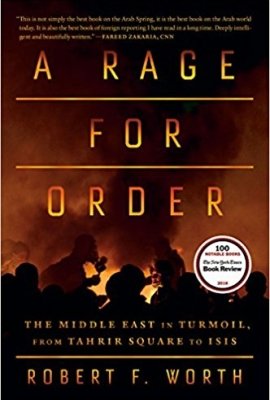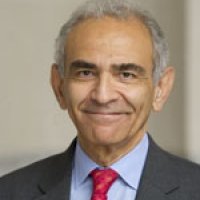A Rage for Order: The Middle East in Turmoil, from Tahrir Square to ISIS
Robert Worth, contributing writer at the New York Times Magazine, discussed his recently published book, A Rage for Order: The Middle East in Turmoil, from Tahrir Square to ISIS, and its accounts of the Arab Spring’s protests and legacies.
On April 26, 2016, the Middle East Program at the Wilson Center hosted the event, “A Rage for Order,” with Worth, the book’s author who is also a former Public Policy Fellow at the Wilson Center. Joseph Sassoon, Associate Professor at Georgetown University and former Fellow at the Wilson Center, served as a discussant and moderator.
Following Sassoon’s introduction, Worth shared how writing this book was challenging given the unpredictable nature of the Arab Spring. His first instinct, he said, was to focus on a single country. He initially selected Yemen, given that its revolution lasted longer than in anywhere else and was considered a model, nonviolent transition. Then, following the July 2013 overthrow of Egypt’s then President Mohamed Morsi, Worth concluded that a book discussing multiple uprisings made the most sense. Therefore, A Rage for Order covers five countries in the region: Egypt, Libya, Syria, Yemen, and Tunisia.
Worth went on to explain how he sees these protests and events as less revolutionary and more as a collapse of several weak states. He questioned, however, whether these states really were so weak; in some ways they have been incredibly strong, given their ability to suppress dissent. Worth also cited Sassoon’s recent book, Anatomy of Authoritarianism in the Arab Republics, and the quote “before fighting despotism, its replacement must be ready.” Worth assessed that practical replacements following the uprisings were not ready and explained that the rise of ISIS in 2014 indicated people’s need for order in the region. The revolts, he said, set a high bar for expectations and a desire for solutions, which ISIS has been successful at providing. Worth shared that in writing this book, he was interested in how personal lives intersected with public crises. As a result, A Rage for Order is a narrative account of characters within the five countries.
Although Worth maintained that these revolutions have been more of a collapse than a beginning, he stressed the importance of looking to the future. He pointed to Tunisia, where there have been elements that merit hope. Ennahda, for example, is now referred to as a Muslim democratic group rather than an Islamist one. The group’s co-founder, Rached Ghannouchi, has served as a crucial leader for the country and has been critical of the Tunisian regime. Worth also discussed moves toward decentralizing governments in the region. He mentioned that Syria’s economic collapse contributed to the revolts, which eventually led to recognition of the need for more flexibility in the economic system. But despite this limited optimism, Worth said his book is an almost relentlessly dismaying portrait of the events during and after the 2011 uprisings.
Sassoon then joined the discussion, commenting how Worth’s inclusion of personal stories help us to better understand the post-revolutionary eras, the countries’ similarities and differences, and the chaos prevailing throughout the region. Sassoon noted that one of the book’s vital issues is polarization, which is highlighted in the book’s look at sectarianism in Syria and what it has done to the fabric of society and relationships.
During the question and answer portion of the event, Worth was asked why we still see governments and groups using destabilizing practices despite this regional rage for order. Worth explained that he sees order in two senses. One is in the sense that ISIS appeals to young people affected by the chaos through its promise of creating structure. The other is that the 2011 protests happened in part out of people’s want for genuine order and to feel like true members of society with rights under a government that has obligations to its citizens.
Worth noted that the real legacy of these uprisings has been a multi-front war riddled with bloodshed, and that revolutions should be avoided at all costs. He added that incremental, gradual change is preferable and will be more likely to lead to long-term transformations.
By Elena Scott-Kakures, Middle East Program
Related Publication

A Rage For Order: The Middle East in Turmoil, from Tahrir Square to ISIS
Speakers

Contributing Writer, The New York Times Magazine; former Beirut Bureau Chief, The New York Times

Professor, Georgetown University
Hosted By

Middle East Program
The Wilson Center’s Middle East Program serves as a crucial resource for the policymaking community and beyond, providing analyses and research that helps inform US foreign policymaking, stimulates public debate, and expands knowledge about issues in the wider Middle East and North Africa (MENA) region. Read more
